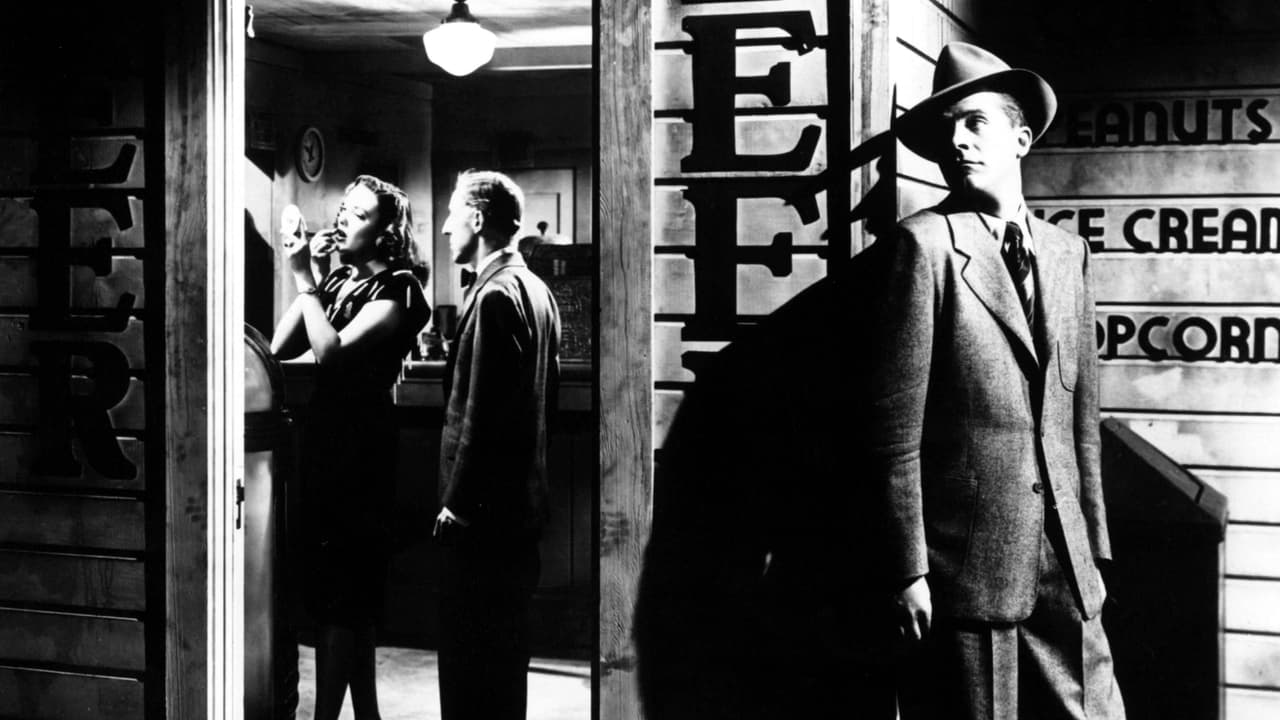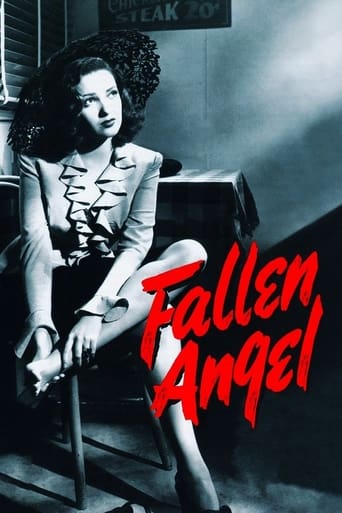Btexxamar
I like Black Panther, but I didn't like this movie.
Phonearl
Good start, but then it gets ruined
Voxitype
Good films always raise compelling questions, whether the format is fiction or documentary fact.
Lachlan Coulson
This is a gorgeous movie made by a gorgeous spirit.
weezeralfalfa
Young middle-age Eric Stanton is down on his luck: broke after squandering his substantial savings on gambling. He's found a young knockout waitress(Linda Darnell, as Stella) at a bus stopover, on the way to San Francisco, who he would like to marry. But, he has competition. She wants a home and other things right away. Since he is jobless, he will have to use his imagination to come up with the dough. His competition seems to be mostly several middle-aged men who are regulars at Pop's drugstore, where she works. They take her out on dates with their car. But Eric has no car and no money to take her out. Then, he finds out about a pair of spinster sisters: June(Alice Faye)and Clare( Anne Revere) Mills, who inherited their house and considerable money. He schemes to marry one, take most of her money, then divorce her, and marry Stella. Easier said than done, as he discovers. After establishing a relationship with 'Professor' Matley(John Carradine): a spiritualist, Eric contacts the pair and offers them tickets to a séance, which will feature their deceased father. They reluctantly agree, but are not impressed with the 'show'. However, Eric continues to engage their attention. Soon, it's plain that June, the better looking sister, is interested in him. Soon, they shock everyone, especially sister Clara, by announcing they got married that day. That evening, Eric goes to Stella, and tells her the story and that he will soon have the money for a house, and then will divorce June. But Stella doesn't buy it , and goes on her planned date with Dave Atkins(Bruce Cabot). The next morning, everyone is dumbfounded by the news that Stella was murdered last night. Her estimated time of death is an important detail in ruling out various suspects, including Eric. Nonetheless, the investigator Mark Judd(Charles Bickford) keeps Eric in mind as a prime suspect. Thus, the remainder of the film is mostly devoted to trying to prove who murdered Stella, and to strengthening the Eric/June relationship.......We can understand why Stella would want to date a variety of men, with her ultimate goal of marrying one who can immediately provide her with a home. In contrast, June seems not particularly interested in men. She already has a home and plenty of money she inherited. Thus, she's not dependent on a man to provide these things. Why then would she fall for Eric, who had the smell of a con man? My guess is she saw in Eric a handsome man, about her age, whom she thought had potential to be a good provider, if he was given some help to get back on his feet, and hopefully reign in his weaknesses(especially gambling). She didn't know he was a compulsive gambler until after they were married. Now, she has to fear he could gamble away her inheritance. Both Eric and Stella seem narcissistic, in contrast to June, who seems nurturing. I suspect she hopes she can convert Eric into being nurturing too, after he gets on his feet, financially. See the movie, available at YouTube, to find out who murdered Stella.
clanciai
After "Laura" Otto Preminger took a step down to a slightly more shabby intrigue and environment. The joint in which Dana Andrews lands after his fall is not a place anyone would visit willingly and especially not for the sake of Linda Darnell. Her being the main attraction there for which all men become regulars is the worst possible recommendation for a common road house.Dana Andrews is the fallen angel who is thrown off a bus and lands in this miserable place, where he meets a sinister veteran police officer with some scarred experience, a pathetic owner and Linda Darnell. She hooks him, he goes mad about her and promises her anything, even venturing on criminal plans, finding two sisters with some fortune he could use, one of them being Alice Faye, a church organist, who falls in love with him to her sister's grest dismay. Her alarm is justified indeed. There it starts.It's a great story and perfect intrigue expertly handled, but what then is wrong here? There is only one flaw: Linda Darnell. She is terribly miscast and least of all convincing. How could any man fall for such a mean presumptuos creature, a shallow hooker without soul, and yet everyone seems to do just that, hopelessly and desperately.Dana Andrews' doubtful character is the main thriller of the film. No one knows anything about him, the audience least of all, he is a loser and maybe a criminal one, you can suspect all the worst about him, as Alice Faye's non-nonsense sister has every reason to do, and only gradually his real character comes into light, mainly in the great hotel scene in San Francisco, an even shabbier place than the road joint, clearly pointing out the direction of Hitchcock's "Vertigo" 14 years later. That long scene makes the film a masterpiece in spite of Linda Darnell.
JohnHowardReid
Moody, dazzlingly directed film noir. Preminger in marvelous form. Long takes, fluid camera-work, shadowy lighting and dramatic angles re-enforce its bizarre, nightmarish atmosphere.The visuals abound in symbols and contrasts, all of which re-enforce the suspenseful film noir mood. Preminger's expertise is capped by a remarkable long take as Faye is waylaid by the police, the camera spinning around with the cop car to a most effective dolly in on witness Andrews, standing on the kerb. Acting is particularly strong for a Preminger picture. Andrews perfectly cast as the surly, conniving anti-hero. Linda Darnell gives her most impressive performance ever. The same might be said for Charles Bickford and certainly Percy Kilbride. Solid cameos from Olin Howlin, John Carradine and Bruce Cabot. Easy to recognize Jimmy Conlin as a hotel clerk, but gone are his usual funny voice and panhandling mannerisms. Although her part is not as large as we would expect from her top billing, Alice Faye is thoroughly convincing as the demure miss who falls for sinister Stanton. The light opposed to dark Darnell. The support cast, music, photography, art direction (locations in Orange, California), film editing are inspired, making the taut script derived from Marty Holland's 1945 thriller even more tingling with tension and atmosphere. (The script doesn't cheat on the identity of the real killer either).Definitely one for the permanent collection, "Fallen Angel" is a movie that repays multiple viewings.
vincentlynch-moonoi
Admittedly, I'm not a particular fan of film noir, and even as film noir goes, the first half of this film is a little disappointing. I'm glad I stuck with it, because I felt the second half of the film -- after Linda Darnell's character is murdered -- is better. Or is it just that I'm not a particular fan of Linda Darnell? I always found Dana Andrews to be an interesting actor, and it's unfortunate that his alcoholism led to him fading from the silver screen prematurely. He's very good here, even thought it's difficult to like his character. In fact, maybe that's what's wrong with the first half of the film -- it's not easy to like ANY of the leading characters! Linda Darnell plays her part as a loose woman...seems like she played that part well in more than just this pic. Very difficult to like her in this film.Alice Faye just seemed in the doldrums in the first half of the film, but once she marries Dana Andrews, she turns in a very good performance.Charles Bickford as the retired police detective (and ultimately the murderer) is good, though not outstanding here. The same can be said for the lesser roles by John Carradine and Bruce Cabot.Perhaps the most credit should go to -- surprisingly -- Percy Kilbride. I usually think of him as Pa Kettle, and while I didn't care for that series (after the original "The Egg And I"), he's was quite enjoyable in a number of films. But here, he really shines as a more serious actor, and for a time I was suspecting he was the killer.This film is worth watching, but you do have to stick with it for a while. It won't end up on my DVD shelf, but it was worth watching...once.

